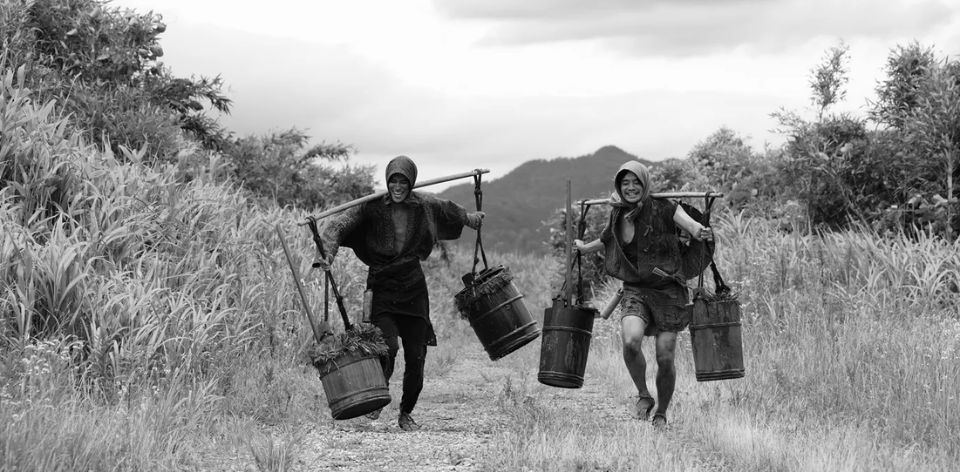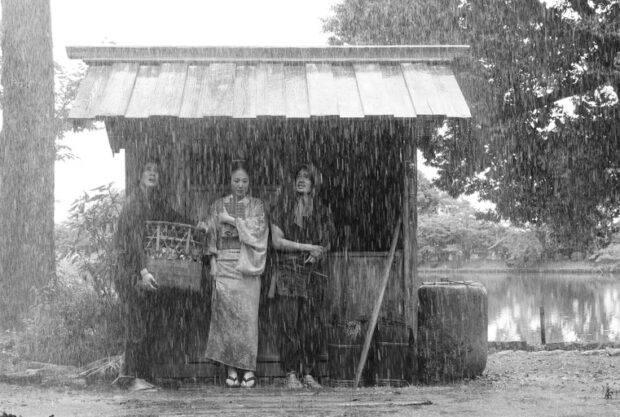If there’s one thing we don’t talk about often enough, it’s how human waste was dealt with during Edo Period Japan. Or, as the title cards of Junji Sakamoto’s scatalogically focused film declare, “after two centuries, the shoguns got sloppy and the country went to shit.” Which is where Sakamoto spends the next 90 minutes, shovelling his characters in and out of that slop.
The jidaigeki was popularised in the west thanks to folks like Akira Kurosawa, a filmmaker who solidified the look and feel of the genre for decades. Sakamoto necessarily recalls those films in this black and white, pillarboxed vision of several seasons between 1858 and 1861. Yet in a question that is bound to go down alongside ‘who fills the Batmobile with gas?’, Sakamoto frames his prologue around the query ‘Where does Edo’s poop go?’
The answer comes in the form of “manure men” Yasuke (Sosuke Ikematsu) and Chunji (Kanichiro Sato), who collect leavings from the city and sell it to farmers for profit. A vital part of the economy, Sakamoto shows that the peasants are often treated with contempt, not the honourable backbone of the isolated Japan that some historical accounts might favour.
Partly set in and around a tenement building in Edo, Sakamoto often plays some of the scenarios for laughs. This is natural when dealing primarily with faecal matter. Indeed, it’s a small mercy that the film’s opening is in black and white, as the sound of slop buckets is tangible enough to test even the staunchest of ASMR aficionados. Still, the sometimes comical setups – such as the flooding and overflow of the toilet system – makes it evident that these people really don’t function well without the manure men. “Without us,” Yasuke proclaims, “Edo is just one big pile of shit.”
Yet there’s also a real heart to the film, especially when dealing with the titular Okiku. A farmer’s daughter and schoolteacher, she dreams of seeing more of the world, but must instead look after her father, a fallen samurai. A love story develops between her and Chunji, who believes his lot in life condemns him to be unworthy of her affection. Following a major turning point in the second act, there’s a grace and poignancy to their interactions, leading to a genuinely touching, and almost wordless, interchange in the finale.
Delivered in booklike chapters, with Norimichi Kasamatsu’s (Under the Open Sky) crisp monochromatic photography punctuated by single colour shots, there’s an incredibly measured pace to OKIKU AND THE WORLD (せかいのおきく). With references in the seasonal headers to ‘Late Spring’ and ‘Early Summer,’ one has to assume that Sakamoto was consciously referencing Yasujirō Ozu. Although Ozu probably never had this much manure on screen.
Touching on class divides and knowing nods to cinema history in equal measure, Sakamoto’s film is a surprisingly graceful look at Edo’s working poor. It attempts to look beyond the closed borders of the era to the universality of the condition, and is the most disarmingly touching film about waste management you’re likely to see anytime soon.
2023 | Japan | DIRECTOR: Junji Sakamoto | WRITERS: Junji Sakamoto, Miyuki Takamatsu | CAST: Haru Kuroki, Kanichiro, Sosuke Ikematsu, Koichi Sato, Renji Ishibashi | DISTRIBUTOR: New York Asian Film Festival (NYAFF) | RUNNING TIME: 90 minutes | RELEASE DATE: 14-30 July 2023 (NYAFF)







